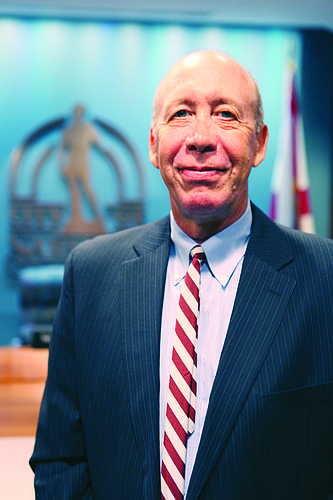- April 25, 2024
-
-
Loading

Loading

City Manager Tom Barwin’s contract states a third-party specialist must conduct his annual evaluation, in an attempt to make the process more conducive to team building. As a result, the evaluation has become a source of division among the City Commission.
During a Jan. 6 meeting, commissioners began the process of finalizing the details of Barwin’s evaluation. Although they were able to agree on a mediator for the process, they failed to find common ground on the process itself. In particular, there was a split after Commissioner Suzanne Atwell suggested the input of a group of prominent citizens be formally included in the review process.
“Sometimes elected officials need help from the community,” Atwell said. “We do represent 50,000 people.”
Atwell has advocated for a broader, more inclusive and qualitative process over the past five years, and was pleased that Barwin’s more open-ended evaluation process could allow for the discussion to extend beyond the confines of City Hall. She felt that was missing from the previous evaluation process, which centered on a numerical ranking system.
Commissioner Paul Caragiulo has pushed for a more cut-and-dry evaluation that would have commissioners fill out a standardized form and the mediator compile a report with that information. He bristled against the notion that citizen input needed to be officially part of the process, saying that commissioners should be informally gauging the feelings of their constituents.
“We have a sort of propensity to pageant-ize everything,” Caragiulo said. “Everything has to be a show and a production.”
Vice Mayor Willie Shaw sided with Caragiulo. He felt the city has a propensity to conduct its business in public when it’s not necessary, and said the city’s charter clearly states the onus for evaluating the charter officials is on the commission.
“We aren’t doing our job, I think, as elected officials,” Shaw said. “I, too, feel like I can talk to anybody on what their feelings are.”
Commissioner Susan Chapman pointed at the 2012 resignation of former City Manager Bob Bartolotta as a development that lacked public awareness and said the public wasn’t on the same page as the commission, as a result. Gathering public input was a measure that could prevent a more insular evaluation, she said.
“I think we need to be aware that the public may have a different view of this than the individual city commissioners,” Chapman said.
One of the citizens mentioned as a potential contributor to the evaluation process saw both sides of the argument. Steve Queior, president of the Greater Sarasota Chamber of Commerce, said he and the chamber would be glad to assist the city with the completion of any of its goals. He also said he felt that part of the city manager’s job involves listening to issues or ideas from the public and coordinating that with the staff, so collecting citizens’ input made sense in that regard.
“I think that’s a role of the city manager, as the top professional, to be out there and taking these things back to the commission, or if they’re not as major an issue, to the appropriate department,” Queior said.
On the other hand, he said, there’s a limit to the knowledge the public has of the city manager’s work, which involves a lot of internal management. He said the commission was already tapped into a diverse mix of opinions from the community and that the public commentary could potentially get out of hand.
“More input would be good input, but, at some point, you have to make the review and evaluation process efficient,” Queior said. “We can’t make a federal project out of this.”
Robert Fuller, the chairman of the Coalition of City Neighborhood Associations, said he would like for a representative from that group to have a voice in the evaluation process. Although commissioners might have the opportunity to interact with their constituents, Fuller said CCNA’s input would provide an impression of the city manager from more than 25 community groups.
“At Saturday’s CCNA meeting, the representative from Amaryllis Park talked about how city management had a positive interaction with the community there,” Fuller said. “That’s the kind of thing that — and I’m sure, from time to time, there have been negative comments — but that’s an example of some of the input we’d be able to provide.”
A decision about the details of the evaluation is still pending, while City Attorney Robert Fournier ensures other aspects of the review process do not violate the state’s Sunshine Law. Until then, a line appears to have been drawn, with one side viewing formalized public input as beneficial, and the other side viewing it as superfluous.
“At the end of the day, the evaluation is yours,” Caragiulo said. “People can come down and speak about whatever they want to speak — there’s an open indefinite invitation to public comment.”
Contact David Conway at [email protected]